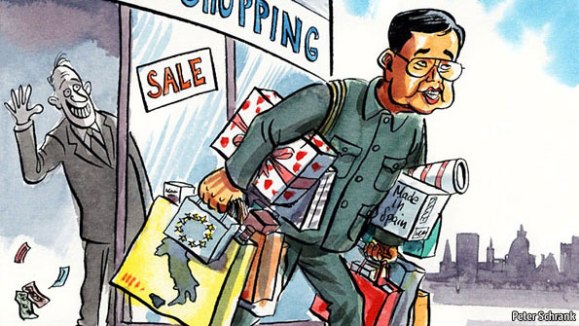Who is the world’s economic super power? Only a few years ago most Americans could confidently and proudly say it was their own country, although with the last four years of minimal growth, the scary truth of China being the world’s leading economic power is coming into fruition.
Over the weekend China reminded us once again why they should not be taken lightly with the majority purchase of AIG, at a price tag of $4.2 billion.
Along with purchase of the government backed green energy battery company, A123 for $256.6 million as well as continued billion dollar investments in the American housing industry, China alone has picked up more than $6.5 billion of American assets in 2012.
From these alarming statistics there may be only one scenario running through your mind. Were the dreams of Eric Cartman in the summer of 2008 a sign of things to come; is China really on their way to taking over the world?
While this may be a bit of a stretch, the Chinese economic machine poses all the ingredients need for a successful and booming economy.
So what has been the recipe for a soaring China and a sinking America? It’s actually quit simple, China makes a lot of things and we don’t. And why is that you may ask? That too is simple; the cheap labor and a lower corporate tax rate make China much more appealing to American manufactures.
With China and America’s corporate tax rate respectively at 25% to 40%, it is only natural for employers to ship jobs overseas and take advantage of lower rates.
When manufactures see that they will be taxed at a much lower rate, the incentive to leave America for a country where they are able to hire more labor leads to more production and higher profits.
Other than the cheap wages that China allows its citizens to work for, the United States can and will have to offer these same incentives to not only its own people, but other overseas industry that would in time bring more jobs, revenue, and help to restore America as an elite world power.
If President Obama’s administration fails to address this issue, more and more American manufactures will be tempted to test the royalties that wait in a country such as China, especially when we are only months away from the possible “fiscal cliff”.
The mantra is simple; we as a country are making it impossible for growth by taxing our citizens and companies at enormously high rates for programs and entitlements we can no longer afford.
We must get back to spending by necessity, creating a friendly job climate for investors with low tax rates, and promote incentives not only for large but small business owners instead of more and more job killing regulations.

